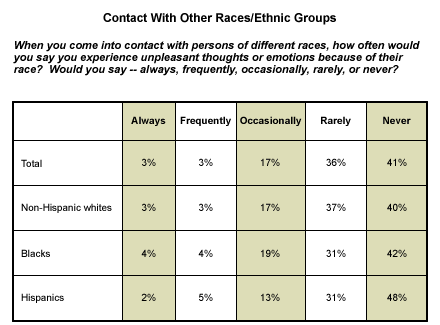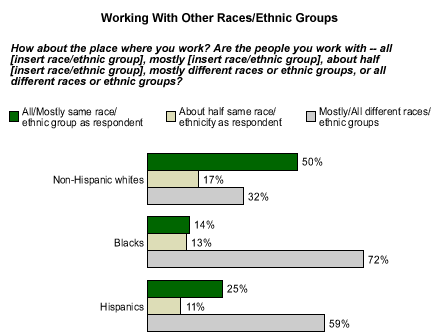Many Americans like to believe that the years of rampant racism and discrimination in this country are now part of the past. While that may be largely true on the national level, what is the situation like on a highly personal level? How do Americans feel when they interact with people from other races in their daily lives?
According to Gallup's recent Minority Rights and Relations poll*, few Americans say they experience frequent unpleasant thoughts or emotions when they encounter people from different races. About three-quarters of Americans (77%) indicate that they "rarely" or "never" have such unpleasant feelings, and less than a fifth (17%) of those polled report that they occasionally have unpleasant thoughts when they come into contact with a person from a different race. Only 6% of Americans say they "always" or "frequently" have unpleasant thoughts or emotions in this situation. These percentages vary little when broken down by race and ethnic group.

Among the respondents who say they "occasionally" have unpleasant thoughts or emotions about someone because of their race was a 63-year-old white male from Missouri, who was interviewed after the survey. "But it's a pragmatic issue, not racial bias," he says. "Anyone walking into a known high-crime, minority neighborhood is aware that the odds of becoming a victim of a crime are statistically greater there."
"Prejudice always works against the minority population," he says. "I lived in Alaska and saw whites treated very badly by Native Americans."
Work Environments Tend to Be Diverse
Another question from the same survey indicates that a large number of Americans, particularly those who are Hispanic or black, now work in racially diverse environments.
Employed whites are the least likely to work with people of other races or ethnic groups. Fifty percent (50%) of whites say that the employees in their workplaces are all or mostly white, 17% say their workplaces are about half white, and 32% report that their workplaces are mostly or all different races and ethnic groups.
Only 14% of employed blacks and 25% of employed Hispanics say their workplaces are all or mostly the same race or ethnicity, while 13% of blacks and 11% of Hispanics report that their workplaces are about half the same race or ethnicity. Nearly three-fourths (72%) of blacks and 6 in 10 (59%) Hispanics work in places where workers are from mostly all different races and ethnic groups.

Relationships with racially diverse coworkers may help ease many Americans' apprehension about other races. "My workplace is very mixed. I work with a lot of African-Americans -- both as coworkers and patients," says a 36-year old white woman from Ohio who works in a rehabilitation center. She said she "rarely" has unpleasant thoughts about people of other races. When asked what she attributes her comfort level to, she says, "I was raised with few minorities, but as an adult I specifically chose a city that prides itself on diversity. It's important to me."
*Results are based on telephone interviews with 2,250 national adults, aged 18 and older, conducted June 9-30, 2004, including oversamples of blacks and Hispanics that are weighted to reflect their proportions in the general population. For results based on the total sample of national adults, one can say with 95% confidence that the maximum margin of sampling error is ±5 percentage points.
Results for the sample of 816 non-Hispanic whites, aged 18 and older, are based on telephone interviews conducted June 9-30, 2004. For results based on the total sample, one can say with 95% confidence that the margin of sampling error is ±6 percentage points.
Results for the sample of 801 blacks, aged 18 and older, are based on telephone interviews conducted June 9-30, 2004. For results based on the total sample, one can say with 95% confidence that the margin of sampling error is ±8 percentage points.
Results for the sample of 503 Hispanics, aged 18 and older, are based on telephone interviews, conducted June 9-30, 2004. For results based on the total sample, one can say with 95% confidence that the margin of sampling error is ±8 percentage points. (164 out of the 503 interviews with Hispanics were conducted in Spanish).
